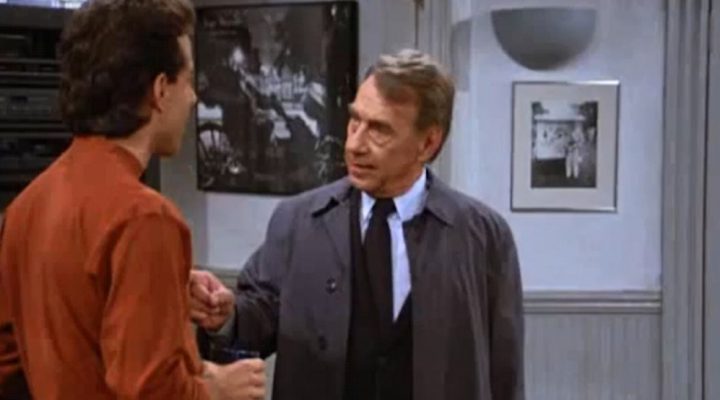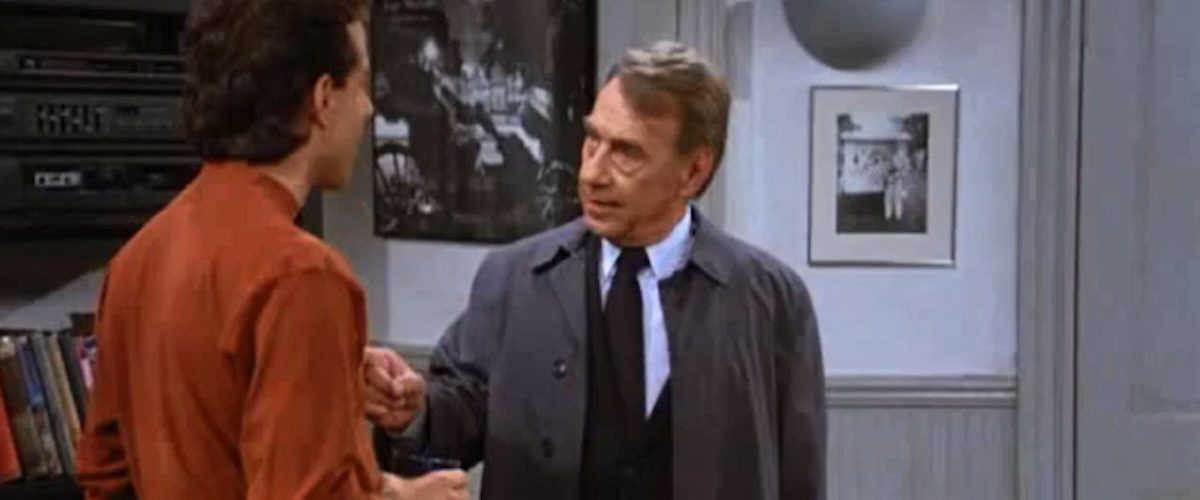It feels like 1971.
That was a bad year for libraries. Bad year for America. Hippies burning library cards. Abbie Hoffman telling everybody to steal books. And smirking funny boy Jerry Seinfeld checking out a book from the New York Public Library he never returned.
Or so claimed Mr. Bookman, the grizzled “library cop” who tracked Jerry to his apartment to recover the book, 25 years overdue.
It’s one of the funniest scenes in the Seinfeld show’s long run. Many of us can relate, because we’ve encountered a grouchy librarian somewhere between kindergarten and college, shushing us for disrupting the sacred silence of the stacks, scolding us for hoarding a book.
I’m searching for Mr. Bookman these days.
He’s an endearing parody of order and decency, of obeying the rules, a throwback to those quaint times when most people observed a social contract that staved off chaos. The library represented civilized society — and we’ve messed it up, perhaps beyond repair.
Stumbling into 2024, America and the Western world seem barely to be holding on as conflicts rage, ideological tribes claw at each other, institutions crumble and barbarians storm the gates.
“Holding back from the brink in 2023 has simply deferred vast crises to 2024.”
True, “It could have been immeasurably worse,” cautioned CNN global analyst Nick Paton Walsh of 2023’s nonstop horror show. “But holding back from the brink in 2023 has simply deferred vast crises to 2024. The post-COVID world is exhausted, cash-strapped, but ultimately more fraught than for decades.
“Overshadowing it all will be a flagging hyperpower, at best distracted with presidential elections, at worst tearing itself apart in voting disputes and political extremism. The likelihood the United States will be occupied by its own traumas amplifies each risk. The geopolitical given of a U.S. response (to international threats and crises) will be absent, fueling authoritarian ambition, or a radical upending of the global order. 2024 could make 2023 seem rational and sober.”
Thanks for that cheery thought, Nick.
A fragile idea
With authoritarianism, nationalism, populism, extremism, gangsterism and nihilism pressing in from all sides — and most dangerously, from within — the very idea of Western democracy has not seemed so fragile since the heyday of communism, when Soviet strongman Nikita Khrushchev promised he would bury us.
Indeed, modern democracy is first and foremost an idea, a radical experiment in self-government introduced during the Enlightenment (religious freedom is another idea of the time) and applied only in fits and starts during the past few centuries — a mere moment in the stream of human history. We Americans, who have benefited the most from its fruits, foolishly believe democracy is somehow permanent, that we can abuse it, ignore it, corrupt it, or step out on it while flirting with dictatorship.
“We Americans, who have benefited the most from its fruits, foolishly believe democracy is somehow permanent, that we can abuse it, ignore it, corrupt it, or step out on it while flirting with dictatorship.”
It doesn’t work that way. If we the people, or enough of us, fritter away our freedoms, allow clowns and criminals to represent us, invite tyrants to rule over us, democracy will cease to exist.
It occurs to me that liberals and conservatives alike might agree with the previous paragraph. But their definitions would differ on how the freedom frittering happens and who the clowns and tyrants are. Progressives fear losing their right to an advancing army of theocrats, extremists and nationalists. Conservatives fear losing their liberties to the ever-expanding administrative state and the ever-changing dictates of postmodern culture.
There’s truth — and self-deception — on both sides.
However, as long as I’ve distrusted Big Government and liberal busybodies, the far greater threat to democracy now comes from the Right. Or the zombie body of what once was the Right — possessed by a dark, nativist populism that seems ready to give supreme political power back to Donald Trump (or some dictator wannabe like him). This irrational impulse persists among tens of millions of voters, polls tell us, even after their criminal leader tried to overturn a democratic election and still falsely claims it was stolen.
“Too many voters today are easily conned, deeply biased, impervious to fact and bereft of survival instincts,” observed journalist Mort Rosenblum. “Contrary to myth, frogs leap out of heating pots. Stampeding cattle stop at a cliff edge. Lemmings don’t really commit mass suicide. We’ll find out about Americans in 2024.”
Europe on the brink
And not just Americans. For Europeans, who have enjoyed the protection and economic bounty of the Western democratic alliance since World War II (or the end of the Cold War, for Eastern European states liberated from communist tyranny), the responsibilities of freedom now seem too much to bear.
Our closest ally, England, inflicted economic devastation upon itself with the isolationist Brexit disaster and now debates whether to send immigrants to Rwanda. The radical, racist, anti-immigrant Right has taken power in Italy and the Netherlands and threatens to do so in France. Viktor Orban, who has systematically strangled democracy in Hungary, campaigns to spread his brand of authoritarianism across Europe and America (many Republicans love him). Orban, Vladimir Putin’s most reliable supporter in NATO, also works night and day to sabotage European support for Ukraine’s struggle to fend off the Russian tyrant’s onslaught.
The one bright spot in Europe’s political darkness at the moment is Poland, where voters recently rejected the right-wing government that nearly destroyed its hard-won democratic institutions.
“If the war has become ‘too expensive,’ … how expensive will it be when Russia invades a NATO member?”
Correction: The other European bright spot is the reinvigoration of NATO, jolted out of its slumber by Russia’s brazen invasion of a democracy in the heart of Europe. But NATO’s European members, like the United States, seem to be going wobbly as the Ukraine war drags on. If the war has become “too expensive,” as fair-weather friends in Europe and the House Republican caucus complain, how expensive will it be when Russia invades a NATO member?
Trump, of course, hates NATO. If elected again, he will continue to undermine and weaken the alliance at every opportunity. Formal withdrawal isn’t even necessary to fatally wound the defense pact, explained Anne Applebaum, a writer for The Atlantic and author of Twilight of Democracy: The Seductive Lure of Authoritarianism.
“Once the (U.S.) commander in chief says, ‘I will not come to an ally’s aid if attacked,’ why would anyone fear NATO, regardless of what obligations still exist on paper?” Applebaum wrote. “And once the Russians, or anyone else, no longer fear a U.S. response to an attack, then the chances that they will carry one out grow higher. If such a scenario seems unlikely, it shouldn’t. Before February 2022, many refused to believe there could ever be a full-scale Russian invasion of Ukraine.”
Fear and loathing
What lies behind this apparent readiness to abandon the democratic institutions that have afforded peace and prosperity to America and Western Europe for generations? Weariness and complacency, perhaps. Ignorance or forgetfulness about what life was like under earlier tyrants.
Fear and loathing, for sure.
Fear of the immigrants and refugees who miserably crowd our borders and float in leaky boats on the Mediterranean and the English Channel. Fear of losing national cultures and traditions to the Other. Loathing of “the Elites,” whoever they are, and their supposed contempt for common folk. And pathetically gullible faith in liars who manipulate this fear and hatred in order to gain power.
It’s difficult to believe, after the totalitarian slaughters of the 20th century, that so many people in free (for now), democratic countries would be tempted to submit to notions that have caused so much suffering and subjugation in the recent past, and that continue to enslave minds and bodies in many places. But it’s happening.
“Things fall apart; the center cannot hold,” the poet W.B. Yeats famously warned. “Mere anarchy is loosed upon the world, The blood-dimmed tide is loosed, and everywhere the ceremony of innocence is drowned … .”
There come moments in history when the loss of belief in an idea — or the embrace of a new one — leads to revolution: 1500, the spread of the printing press and the birth of the Reformation. 1776 in the American colonies. 1789 in Paris. 1917 in Russia. 1933 in Germany. 1968 on the streets of Europe and America. Such moments may bring the fresh winds of freedom — or the beginning of a new dark age.
“Voices grow shrill, parties form and adopt names or are tagged with them in derision and contempt,” wrote Jacques Barzun in his classic book, From Dawn to Decadence: 500 years of Western Cultural Life.
“Again and again comes the shock of broken families, broken friendships. … Authorities are bewildered, heads of institutions try threats and concessions by turns, hoping the surge of subversion will collapse like previous ones. But none of this holds back the transfer of power and property which is the mark of revolution and which in the end establishes the Idea.”
If such an idea has once again arrived in the West, and if it requires the death of democracy to enact, I am prepared to fight it with all my strength. I hope you are, too. Hard days lie ahead.

Erich Bridges
Erich Bridges, a Baptist journalist for more than 40 years, has covered international stories and trends in many countries. He lives in Richmond, Va.
Related articles:
We are all ‘made of one blood,’ remember? | Opinion by Bill Leonard
‘Vermin’: Trump crosses fully into Nazi territory | Opinion by Robert P. Jones
One thing that must happen in 2024 | Opinion by Mark Wingfield
Most Americans believe democracy is at risk in 2024 — but for different reasons


